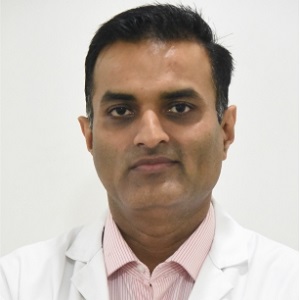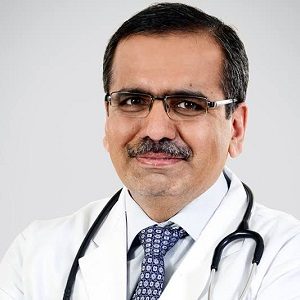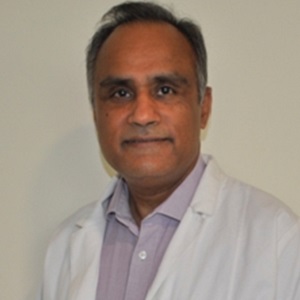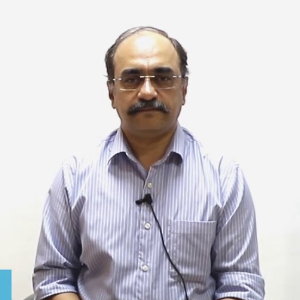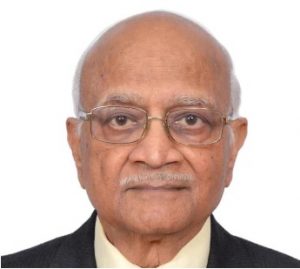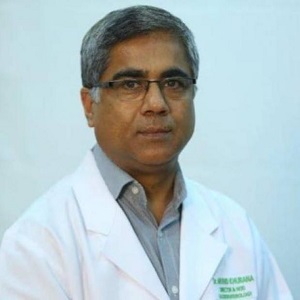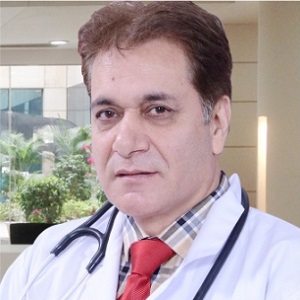Best Doctors in India for Whipple Procedure
- Gastroenterologist, Gurugram, India
- Over 15 years’ experience
- Artemis Hospital, Gurgaon
Profile Highlights:
- Dr. Pawan Rawal is a highly skilled Gastroenterologist with over 12 years of experience in clinical Gastroenterology and Hepatology. He is currently associated with Artemis Hospital, Gurugram as the Head of Gastroenterology Department, Unit I.
- Dr. Rawal is proficient in handling various luminal, hepatic, pancreatic, biliary, and systemic diseases. His extensive training includes both noninvasive and invasive procedures. He performs a variety of diagnostic and therapeutic endoscopic procedures, such as adult and pediatric upper GI endoscopies, colonoscopies, ERCPs, capsule endoscopies, and pushes and double balloon enteroscopies.
- Top Medical Gastroenterologist and Hepatologist | Apollo Hospital, New Delhi, India
- 30+ Years Experience
- Indraprastha Apollo Hospital, New Delhi
Profile Highlights:
- Dr. Yogesh Batra is one of the best medical gastroenterologists in New Delhi, India. He has been a practicing gastroenterologist for more than three decades. Currently, Dr. Batra is serving as a Senior Consultant in the Department of Gastroenterology and Hepatology at Indraprastha Apollo Hospitals, New Delhi.
- His expertise spans various aspects of gastroenterology, including liver diseases, endoscopy, inflammatory bowel disease, pancreatic disorders, and gastrointestinal malignancies.
- Additionally, Dr. Batra is skilled in performing a wide range of GI procedures such as upper and lower GI endoscopies, diagnostic and therapeutic ERCPs (both biliary and pancreatic), endoscopic ultrasound (EUS), and EUS-guided procedures like FNA and biliary drainage. He is also experienced in upper and lower GI manometry and motility studies.
- Top Pediatric Gastroenterologist | Apollo Hospital, New Delhi, India
- 26+ Years Experience
- Indraprastha Apollo Hospital, New Delhi
Profile Highlights:
- Dr. Anupam Sibal is a renowned Pediatric Gastroenterologist and Hepatologist in India with a distinguished career spanning 25+ years. He is currently a Senior Consultant Gastroenterologist and Hepatologist at Indraprastha Apollo Hospital in Delhi, where he has made significant contributions to the field.
- In 1997, Dr. Sibal played a pivotal role in establishing the pediatric gastroenterology and hepatology division at Apollo Hospital, the first of its kind in India’s private sector. The following year, he helped launch the country’s first successful pediatric liver transplant program at Apollo Hospitals. This program has become the busiest solid organ transplant program globally since 2012.
- Dr. Sibal’s leadership extended to a broader role as the Group Medical Director of Apollo Hospitals at the age of 37 in 2005, overseeing 12 hospitals with 3,400 beds and a revenue of USD 139 million.
- Gastroenterologist, Gurugram, India
- 42 years’ experience
- Fortis Memorial Research Institute
Profile Highlights:
- Dr. (Prof) Gourdas Choudhuri is the distinguished Chairman of the Department of Gastroenterology and Hepatobiliary Sciences at Fortis Memorial Research Institute, Gurugram.
- With a remarkable career spanning over 42 years, Dr. Choudhuri is a leading figure in gastroenterology, renowned for his contributions as a medical educator, researcher, and philanthropist.
- His academic excellence include, prestigious degrees like MD, DM, FACG, FICP, FAMS, FRCPI.
- Top Medical Gastroenterologist, Hepatologist | Apollo Hospital, New Delhi, India
- 35+ Years Experience
- Indraprastha Apollo Hospital, New Delhi
Profile Highlights:
- Dr. Sanjay Sikka is a general physician who specializes in medical gastroenterology. He is a gastroenterologist and hepatologist with over 32 years of experience in liver disease, therapeutic endoscopy, and gastrointestinal consultations.
- Dr. Sikka is practicing as a senior consultant in the Gastroenterology department at Indraprastha Apollo Hospitals, New Delhi.
- Being Professor at the GSUM Medical College in Kanpur, Dr. Sanjay Sikka was also involved in scholarly activity. He has several papers that appeared in numerous national and international periodicals.
- Top Gastroenterologist | Max Hospital, Saket, New Delhi, India
- 33+ Years Experience
- Max Super Specialty Hospital, Saket, New Delhi
Profile Highlights:
- With over 33 years of distinguished experience in Gastroenterology, Hepatology, and Endoscopy, Dr. Vivek Raj stands as a leading expert in his field.
- Currently serving as the Principal Director and Head of Department at Max Healthcare, he has dedicated the last 20 years to advancing clinical practices in Gastroenterology.
- Dr. Raj’s specialty interests encompass a range of advanced gastroenterological procedures and conditions, including Therapeutic ERCP, Endoscopic Ultrasound, Hepatology (with a focus on Hepatitis B and C), Gastrointestinal Motility, Capsule Endoscopy, Endoscopic Surgery, and Inflammatory Bowel Disease.
- Top Gastroenterologist and Hepatologist | Max Hospital, Saket, New Delhi, India
- 24+ Years Experience
- Max Super Specialty Hospital, Saket, New Delhi
Profile Highlights:
- Dr. Abhishek Deo is one of the finest Gastroenterologists and Hepatologists in India with an outstanding experience of over 24 years.
- His clinical proficiency lies in the field of Gastroenterology, Liver Disease, Diagnostic Therapeutic Endoscopy, and Advanced Therapeutic Endoscopy procedures.
- After completing the initial 14 years of working hand-in-hand with the top gastroenterologists in UK, he returned back to India in 2010 and started his practice in Gastroenterology and General Medicines.
- Top Medical Gastroenterologist | Apollo Hospital, New Delhi, India
- 45+ Years Experience
- Indraprastha Apollo Hospital, New Delhi
Profile Highlights:
- Dr. D K Bhargava is a Medical Gastroenterologist working at Indraprastha Apollo Hospitals, New Delhi.
- He has 45 years of experience in his field.
- Dr. Bhargava was a Professor of Gastroenterology at the All India Institute of Medical Sciences, New Delhi formerly.
- Some of the services he provides are Colonoscopy, Gastroenteritis Treatment, Acidity Treatment, and Irritable Bowel Syndrome Treatment.
- Exceptionally qualified Dr. D K Bhargava has received the Padma Shri Award and Dr. B C Roy National Award from the President of India.
- He has published more than 150 articles, papers, and journals throughout his career.
- He is a member of the American Gastroenterological Association, Indian Society of Gastroenterology and American College of Gastroenterology.
- GI Surgeon, Gurugram, India
- Over 33 years’ experience
- Fortis Memorial Research Institute
Profile Highlights:
- Dr. Arvind Kumar Khurana is a well-known name in the field of gastroenterology and has a keen interest in Gastroenterology, Hepatology, Endoscopy, Onco-Gastroenterology, and Endoscopic Ultrasound.
- Dr. Khurana has successfully performed over 1,50,000 Endoscopic procedures, including over 20000 cases of EPT/CBD stones removal & Biliary Stenting, 2000 metallic stenting, 950 cases of foreign body removal, and 2000 PEG cases.
- Gastroenterologist, Gurugram, India
- Over 17 years’ experience
- Artemis Hospital, Gurgaon
Profile Highlights:
- Dr. M A Mir is a well-known Gastroenterologist and Endoscopist with a vast experience of more than 17 years in the field of Gastroenterology.
- Before joining Artemis Hospital he was associated with Pushpawati Singhania Research Institute for Liver and Digestive Diseases, New Delhi as a Consultant Gastroenterologist and Endoscopist.
- He is experienced in all gastrointestinal procedures such as diagnostic and therapeutic upper and lower GI endoscopies.
Best Hospitals in India for Whipple Procedure
- City: Gurugram, India
Hospital Highlights:
- One of India’s best and largest multi-specialty hospitals, Medanta was built with the aim to bring India to the highest standards of medical care. The hospital has been providing the best medical services to its patients, since its inception, with care, commitment, and compassion.
- Equipped with 1250 beds, the hospital was founded by Dr. Naresh Trehan in the year 2009 with an aim to provide the best medical care at affordable costs. The hospital is spread across 43 acres and includes 45 operation theatres and 350 beds dedicated solely to ICU. The hospital includes over 800 doctors, and more than 22 specialty departments and has a dedicated floor for individual specialty in order to offer the best services under one roof.
- The hospital is considered one of the premier institutes in India for Cardiac Care and includes staffs and members of high caliber. The hospital has 6 distinct centers of excellence.
- City: Gurugram, India
Hospital Highlights:
- Artemis Hospital, established in 2007 in Gurugram, India, is a leading multi-specialty institution known for its excellence in patient care and advanced medical technology, offering comprehensive services across specialties like Cardiology, Oncology, Neurology, Orthopedics etc.
- Renowned for its patient-focused care, Artemis Hospital combines state-of-the-art infrastructure with a team of internationally trained doctors and surgeons, ensuring the highest standards of medical treatment.
- Accredited by JCI and NABH, Artemis Hospital meets global healthcare quality and safety standards, reflecting its commitment to providing compassionate, personalized care.
- The hospital is recognized for utilizing cutting-edge diagnostic and ther*peutic techniques, ensuring patients receive accurate diagnoses and effective treatments tailored to their needs.
- City: Chennai, India
Hospital Highlights:
- The Apollo Proton Cancer Centre in Chennai is the most sought-after private cancer hospital in India. It is an integrated facility that provides cutting-edge, all inclusive cancer treatment to patients all over the globe.
- The hospital is a part of the renowned Apollo Group which has a large network of over 74 hospitals in India and across the globe. Out of the 74 hospitals, 21 of them are cancer centres. However, Apollo Proton Cancer Centre is the only cancer hospital to have JCI accreditation.
- The Centre, which was established on the principles of excellence and expertise, unites a formidable medical staff led by some of the most illustrious figures in cancer treatment.
- The hospital follows the global ASTRO Model Policy. It is the same global policy which is followed by countries like USA, UK, and Europe.
- Apollo Proton Cancer Centre is among the very few hospitals in India to receive patients from First World countries such as USA, Canada, New Zealand, Australia, Singapore, Thailand, etc.
- Apart from that, it is also the first hospital in Chennai to receive patients from several countries like Uzbekistan, Kazakhstan, Turkmenistan, Georgia, Armenia, Azerbaijan, SAARC countries (Bangladesh, Nepal, Sri Lanka, Maldives, Bhutan, Afghanistan, and Pakistan), South Africa, Turkey, Egypt, etc.
- In fact, there is a dedicated team at the Apollo Proton Cancer Centre that serves only international patients. Thus, on a monthly basis, the Centre receives patients from across 32 countries.
- Moreover, there are certain treatments in Apollo Proton Cancer Centre that are not available in any other centre. APCC addresses all types of possible cancers that are usually not covered by any other centre.
- City: New Delhi, India
Hospital Highlights:
- Over the last 33 years, the Fortis Escorts Heart Institute has set new standards in cardiac treatment with groundbreaking research. It is now known around the world as a centre of expertise for Cardiac Bypass Surgery, Interventional Cardiology, Non-invasive Cardiology, Paediatric Cardiology, and Paediatric Cardiac Surgery.
- The hospital has cutting-edge laboratories that perform a wide range of diagnostic tests in Nuclear Medicine, Radiology, Biochemistry, Haematology, Transfusion Medicine, and Microbiology.
- Fortis Escorts Heart Institute boasts a diverse group of bright and experienced doctors who are backed up by a team of highly qualified, experienced, and devoted support professionals as well as cutting-edge equipment such as the recently installed Dual CT Scan.
- Approximately 200 cardiac doctors and 1600 personnel currently collaborate to manage over 14,500 admissions and 7,200 emergency situations each year. The hospital now has a 310-bed infrastructure, as well as five cath labs and a slew of other world-class amenities.
- City: Gurugram, India
Hospital Highlights:
- Fortis Memorial Research Institute (FMRI) is a premier multi-super-specialty, quaternary care hospital, known for its exceptional international faculty, top-tier clinicians, super-sub-specialists, and specialized nurses, all supported by cutting-edge technology.
- It is the flaship hospital of Fortis Healthcare Limited, part of IHH Healthcare Berhad, a leading integrated healthcare services provider in India. As one of the country’s largest healthcare organizations, Fortis operates 28 healthcare facilities with over 4,500 operational beds (including O&M facilities) and more than 400 diagnostic centers (including joint ventures).
- Recognized as one of the top hospitals in India, FMRI serves as a leading referral center and aspires to be the ‘Mecca of Healthcare’ for India and beyond. Its 11-acre campus is a testament to its commitment to providing world-class healthcare.
- Accredited by JCI and NABH, FMRI is dedicated to maintaining the highest standards of healthcare quality and safety, ensuring that every patient receives the best possible care. The hospital’s reputation is further enhanced by its state-of-the-art facilities and innovative medical practices.
- City: New Delhi, India
Hospital Highlights:
- The Indian Spinal Injuries Center (ISIC), provides state-of-the-art facilities for the management of all types of spinal ailments.
- Staffed with internationally trained, acclaimed, and dedicated spine surgeons, the hospital provides cutting-edge medical & surgical technology. The hospital provides comprehensive management of spinal injury, back pain, spinal deformities, tumors, osteoporosis, etc.
- The hospital performs motion-preserving spine surgeries including disc replacement and dynamic fixation, and minimally invasive spine surgeries such as endoscopic disc excision.
- The orthopedic service of the hospital covers all orthopedic ailments including trauma, joint diseases & replacements, oncology, pediatric orthopedics & upper limb ailment.
- City: Faridabad
Hospital Highlights:
In the sprawling city of Faridabad, where healthcare needs are diverse and ever-evolving, one institution has consistently stood out as a beacon of excellence in the field of medicine—Marengo Asia Hospital. Established with a vision to provide world-class healthcare services to the community it serves, Marengo Asia Hospital has emerged as a trusted name synonymous with quality, compassion, and innovation in healthcare.
- City: New Delhi, India
Hospital Highlights:
- Indraprastha Apollo Hospital is a 700-bedded multispecialty hospital in the heart of the capital of India. It is a part of Apollo Hospital group, one of India’s most reputed healthcare chains. Indraprastha Apollo Hospital has been accredited by Joint Commission International, making it the first internationally accredited hospital in the country in 2005.
- There are 52 specialties in the hospital with one of the best cardiology centers in the country. The hospital is also equipped with State of the art infrastructure facilities with the largest Sleep Lab in Asia and the largest number of ICU bed facilities in India.
- The latest and highly advanced technologies that are installed in the hospital include Da Vinci Robotic Surgery System, PET-MR, PET-CT, Cobalt-based HDR, Brain Lab Navigation System, Tilting MRI, Portable CT scanner, 3 Tesla MRI, 128 Slice CT scanner, DSA Lab, Endosonography, Hyperbaric Chamber and Fibro scan.
- City: New Delhi, India
Hospital Highlights:
- One of the well-regarded providers in India committed to the highest standards of clinical excellence and patient care, Max Super Specialty Hospital is a part of Max Healthcare, which is the second-largest healthcare chain in India. Regarded as one of the most well-regarded healthcare providers in the country, Max Super Specialty Hospital is committed to the highest standards of clinical excellence as well as patient care. The hospital is also equipped with the latest technology as well as cutting-edge research. The hospital is known to deliver and ensure the highest level of patient care.
- The hospital has more than 500 beds and offers treatment for over 35 specialties. The hospital also holds the credit of having installed the first Brain Suite in Asia. This is a highly advanced Neurosurgical machine that allows MRI to be taken while surgery is ongoing.
- Other advanced and latest technologies are also installed in the hospital such as the 1.5 Tesla MRI machine, 64 Slice CT Angiography, 4D ECHO, LINAC, and 3.5T MRI machine.
- City: Kolkata, India
Hospital Highlights:
- Founded in 2017, the HCG EKO Cancer Centre is a committed, all-inclusive cancer care facility in Kolkata.
- The hospital was collaboratively established by India’s leading cancer care provider HCG (HealthCare Global Enterprises Ltd.), and EKO Diagnostic Pvt. Ltd., a top diagnostic and imaging chain in Eastern India.
- With 88 beds, the hospital provides a full spectrum of services including diagnosis, prevention, screening, second opinions, treatment, rehabilitation, follow-up, and palliative care.
- Additionally, the hospital contains a day-care chemotherapy ward, Neutropenic ward, medical ICU, pharmacy, blood bank, and an IPD wing.
- At HCG EKO Cancer Centre Kolkata, a large team of cancer experts with experience in medical oncology, surgical oncology, radiation oncology, hemato oncology, BMT, and nuclear medicine collaborate to offer a variety of treatment options under one roof.
- Furthermore, the hospital is also known for employing the most advanced radiation technology such as, the Radixact, a next-generation TomoTherapy equipment that provides greater radiation delivery precision.
Whipple Procedure
Whipple procedure or pancreaticoduodenectomy is a medical procedure involving the removal of the head of the pancreas, the duodenum (first part of the intestine), the bile duct and the gall bladder.
Doctors perform this complex operation to treat tumors and disorders related to the intestine, pancreas and the bile duct. It is the most common surgical procedure for the treatment of pancreatic cancer that does not extend beyond the head of the pancreas. After the procedure, your doctor will reconnect the remaining organs to allow easy digestion of the food you eat after the surgery. The Whipple procedure is a lifesaving procedure for people suffering from pancreatic cancer.
Who needs the Whipple procedure?
Approximately 25% of the patients suffering from pancreatic cancer need the Whipple procedure. This is mainly because the tumors of these patients remain confined to the pancreas (head of the pancreas) and do not spread to the surrounding blood vessels, lungs, liver and/or the abdominal cavity. One can go for intensive testing to understand he or she needs the Whipple procedure. In some cases, the doctors perform laparoscopic Whipple procedure by making several small incisions rather than a single large incision. Ultimately, there is lesser blood loss, quick recovery, a short stay at the hospital and fewer complications.
Around 40% of the patients are diagnosed with tumors when they spread beyond the pancreas and are not eligible for the Whipple procedure. However, it is an option rarely for 40% of the patients having a locally advanced disease that continues to spread to the nearby areas or for the patients whose tumors continue to spread to the tail or body of the pancreas.
When should you opt for the Whipple procedure?
Whipple procedure is an option for you if cancer of any other disorder affected your duodenum, pancreas or bile duct. The Whipple procedure is done for cancer for the removal of the tumor and to prevent the growth & spread of the tumor to the surrounding organs. Pancreas, present behind your stomach in the upper abdomen, works with the ducts and the liver carrying bile. The enzymes secreted by the pancreas held in the digestion of food. It also secretes hormones that help to regulate your blood sugar level. Your doctor will recommend the Whipple procedure to you if you have:
- Pancreatic cysts
- Pancreatitis
- Bile duct cancer
- Small bowel cancer
- Other disorders or tumors that involve your pancreas, bile ducts or duodenum.
- Pancreatic cancer
- Pancreatic tumors
- Ampullary cancer
- Neuroendocrine tumors
- Trauma to the small intestine or the pancreas
What to expect?
Before the procedure
You need to check-in and register on the day of the surgery. The staff at the hospital will confirm your appointment, procedure, timings and your appointed surgeon. Your nurse will ask you to change and wear a surgical gown for the surgery. Your doctor will put up an intravenous line (IV line) into the vein of your arm before the surgery. He or she will inject medications and fluid into your veins through the IV line. If you are nervous, then your doctor may also give you some medications to relax you. He or she may place you under an epidural catheter or a spinal injection apart from local nerve blocks in your abdominal wall. This helps in easier and faster recovery without causing any discomfort or pain to you after the surgery. This also decreases the amount of medication for narcotic pain that you may need.
During the procedure
The team will take all the necessary measures and follow all the protocols to ensure that you have effective and safe surgery. The team comprises of pancreatic surgeons, anesthesiologists & anesthetists, specialized surgical nurses, nurses and doctors trained for the surgery. They will administer anesthesia (sleeping medicine) to you.
After you sleep, the doctors will place additional intravenous lines along with other monitoring devices according to the complexity of the condition and your overall health. The team will then, insert a urinary catheter into your bladder. It will drain urine during the surgery and after the surgery. You can remove it after one to two days from the day of surgery. The surgery may require around 6-12 hours which depends on the approach the team is using and the complexity of the surgery. Done under general anesthesia, you will be unaware and fell asleep during the Whipple procedure.
Your surgeon will make an incision or cut in your abdomen to gain access to your internal organs. The size of the incision and its location will depend on the particular situation and the approach of your surgeon. Your surgeon will remove the duodenum (the beginning of the small intestine), the bile duct, the head of the pancreas and the gall bladder in the Whipple procedure. He or she may also remove a part of your stomach or the nearby lymph nodes. Your doctor may perform some other type of pancreatic operations also that depends on the situation.
After the procedure
Most of the people directly shift to the general ward after the surgery for their recovery. The team will monitor your condition and the improvements in your health regularly at various times of the day. Furthermore, they will carefully look out for any complications or signs of infection. Some people even get to walk out of the hospital on the day of the surgery. For your overall recovery, you may expect to stay at the hospital for a week. If your case is complex or you have certain medical conditions, the doctor will admit you to the ICU after the surgery. The nurses in the ICU will regulate your condition and watch for complications if any. The team will give you medications, fluids and nutrition through intravenous (IV) lines.
A urinary catheter will drain urine from the urinary bladder while other tubes will drain blood and fluid from the surgical area. People suffering from particular health conditions or old adults may need to stay in a rehabilitation facility for a few days. Many people can perform their routine activities within four to six weeks from the day of surgery. Your physical condition before the surgery and the complexity of the operation will govern the time required by you for recovery.
Risks
The Whipple procedure is a complex operation that involves open surgery in many cases. There are associated risks during and after the procedure. These risks may be:
- Infection at the site of the incision or within your abdomen
- Weight loss after the surgery
- Development of the fistulas or false channels
- Leakage from the connection of the bile duct or the pancreas
- Bleeding at the site of the surgery
- Diarrhea for two to three months
- Diabetes because of the removal of excess insulin-producing cells from the pancreas.
- Delayed stomach emptying which makes it difficult to keep food down or to eat.
If a highly experienced surgeon is performing the procedure then there are fewer chances of complications. You must ask your surgeon about his or her experience apart from their hospital’s experience regarding Whipple procedure and operations related to the pancreas.

